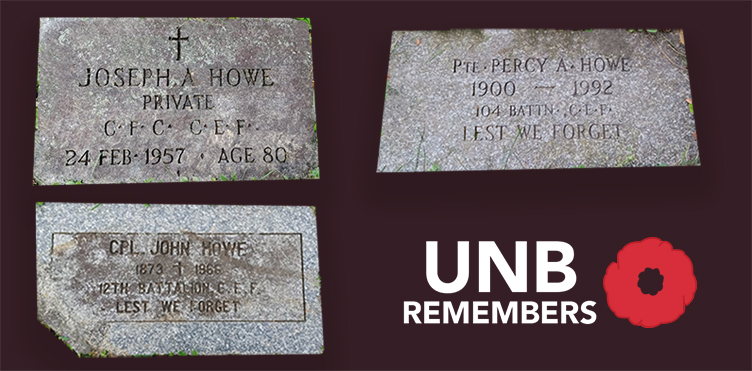Wartime service of Black Canadians
Prepared by Katelyn Stieva (PhD candidate, UNB department of history)

Headstones of John, Joseph and Percy Howe.
Every year on Nov. 11, we pause for a moment of silence and in that moment of silence, we are asked to remember. I have always thought it would be interesting to ask people what they are remembering in those moments of silence.
Considering what and how different people choose to remember asks us to contemplate what it means to remember and why we do so, both on Remembrance Day and throughout the year. In thinking through the question, I would like to share a story of brothers John, Joseph, and Percy Howe.
History of the Howe family
The Howe family is well-recognized among Fredericton’s Black community. The family patriarch, John Howe Sr. moved to the area in the mid-1850s and settled in North Devon on land that is now the home of the Howe family burial plot alongside Howe Street. John Sr., his then wife Ida and son Percy, were living on the same spot when Canada went to war in 1914. Their two other sons John and Joseph had already moved out.
All three brothers enlisted prior to October 1915, an unusual fact given the discrimination and racism Black volunteers faced when trying to enlist. While the Canadian Expeditionary Force (CEF) had no official policy preventing Black men from serving, recruiting officers often denied them the opportunity to serve based on racial biases and beliefs.
It is also noteworthy that each of the brothers joined an integrated infantry unit. A common misconception about Black military service in the CEF, is that all Black soldiers served in one segregated unit, the No. 2 Construction Battalion. As many as 600 Black Canadians served in integrated units across the CEF throughout the war.
John Howe
John, the eldest of the three sons, enlisted first during the earliest days of the war.
Travelling to Valcartier, John joined the 12th Infantry Battalion on Sept. 20, 1914. Although trained as an infantry soldier, he never saw service in that capacity. Instead, he joined the Canadian Army Veterinary Corps in April 1915, and served in France until an injury forced him to return to England where he continued to serve until January 1919 when he returned home to New Brunswick.
Joseph Howe
Joseph was the next to enlist, joining the 55th Infantry Battalion in April 1915.
Similar to his brother, Joseph too was trained as an infantry soldier, but he also never saw combat. A series of illnesses kept him in hospital for most of 1916. By the time he recovered, it was determined that he was no longer fit for combat.
Instead, Joseph was assigned to the Canadian Forestry Corps (CFC) and journeyed to Northern France with No. 11 Company CFC to work on airfields. His unit remained in France for several months after the Armistice, and it was not until May 1919 that he returned home.
Percy Howe
The youngest brother to enlist was Percy. In fact, records tell us that Percy lied about his age and was only 15 when he joined in September 1915.
Percy belonged to the 104th Battalion, but when it was broken up for reinforcements, he found a new home with the 5th Battalion, Canadian Mounted Rifles. Joining his unit in January 1917, Percy saw action at several battles including Vimy Ridge, Hill 70 and Passchendaele before being wounded during a trench raid in March 1918.
After recovering from his injuries, Percy returned to France in late September 1918 only to be wounded again within two weeks. His injuries less severe, Percy recovered at a hospital in France and again joined his unit in December 1918.
Percy was the last to come home, not returning until July 1919.
Returning home
Each of these brothers continued to live in the Fredericton area until the time of their respective deaths.
John returned to his wife and eight children and worked alongside his father at a local mill in North Devon. He lived to see his 90th birthday, passing away in December 1966.
Joseph and his wife also lived close by, though he worked as a machinist at a local factory. Joseph passed away in 1957 at the age of 88.
After marrying in 1920, Percy moved to Kingsclear to work on his father-in-law’s farm as a carpenter. Percy passed away in 1992 at the age of 92.
Remembering the service of Black Canadians
As Black Canadians in uniform, the Howe brothers each chose to serve a country that was not always kind to them. They chose to serve in a military that did not always value their service as being equal to white soldiers. By returning home to Fredericton, they also influenced change in ways they will never know.
As we think about the meaning of Remembrance Day, the stories of John, Joseph and Percy remind us that serving one’s country is not a one size fits all activity.
Remembering the wartime service of Black Canadians is about acknowledging the diversity of people who contributed to the Canadian war effort, as well as the racism and discrimination Black Canadians faced during the First World War. It is about acknowledging the courage it took for Black Canadians to defy systems of oppression to serve their country. With the story of these brothers in mind, remembering is also about ensuring that we do not forget that these systems of racism and oppression continue to operate today.
